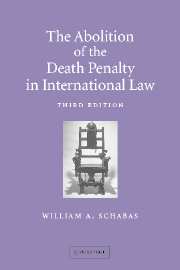Book contents
- Frontmatter
- Contents
- Foreword
- Preface to the third edition
- Table of cases
- Table of international instruments
- List of abbreviations
- Introduction
- 1 The Universal Declaration of Human Rights and recognition of the right to life
- 2 The International Covenant on Civil and Political Rights: drafting, ratification and reservation
- 3 Interpretation of the International Covenant on Civil and Political Rights
- 4 Towards abolition: the Second Optional Protocol and other developments
- 5 International humanitarian law
- 6 International criminal law
- 7 European human rights law
- 8 Inter-American human rights law
- 9 African human rights law
- Conclusion
- Appendices
- Bibliography
- Index
3 - Interpretation of the International Covenant on Civil and Political Rights
Published online by Cambridge University Press: 30 July 2009
- Frontmatter
- Contents
- Foreword
- Preface to the third edition
- Table of cases
- Table of international instruments
- List of abbreviations
- Introduction
- 1 The Universal Declaration of Human Rights and recognition of the right to life
- 2 The International Covenant on Civil and Political Rights: drafting, ratification and reservation
- 3 Interpretation of the International Covenant on Civil and Political Rights
- 4 Towards abolition: the Second Optional Protocol and other developments
- 5 International humanitarian law
- 6 International criminal law
- 7 European human rights law
- 8 Inter-American human rights law
- 9 African human rights law
- Conclusion
- Appendices
- Bibliography
- Index
Summary
The International Covenant on Civil and Political Rights, as a multilateral convention, is subject to the general rules of treaty interpretation. A treaty is to be interpreted in good faith, in accordance with the ordinary meaning to be given to the terms of the treaty in their context and in the light of its object and purpose. Subsequent practice in the application of the treaty is among the elements to be considered in treaty interpretation. The travaux préparatoires, which are of great historical interest and which provide strong evidence of a growing trend in favour of abolition of the death penalty, are in fact only supplementary means for the purposes of interpretation. This rule is all the more relevant in human rights treaties, which are ‘designed rather to protect the fundamental rights of individual human beings from infringements…than to create subjective and reciprocal rights' among States. An undue emphasis on the travaux préparatoires may in fact frustrate the dynamic and evolutive approach that human rights treaties require.
Under the Covenant and its Optional Protocol, a considerable body of ‘jurisprudence’ has developed, principally the work of the Human Rights Committee, the eighteen-member expert body created by the Covenant that considers the obligations of States parties in the context of three implementation mechanisms, one mandatory and the other two optional. The mandatory procedure involves the submission of periodic reports in accordance with article 40 of the Covenant. The initial report is due one year after ratification.
- Type
- Chapter
- Information
- The Abolition of the Death Penalty in International Law , pp. 93 - 154Publisher: Cambridge University PressPrint publication year: 2002



